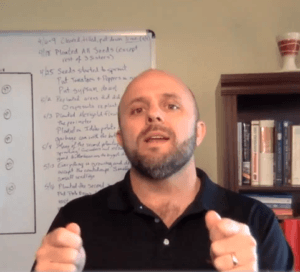It’s a fact that food insecurity is getting steadily worse in the United States in part because of the coronavirus, a Baptist mission expert reports.
But it’s a myth that hunger and poverty are conditions Americans simply have to accept, added Jason Coker, director of the Cooperative Baptist Fellowship’s Together for Hope rural development initiative.

Jason Coker
“They are getting worse and worse, but it is not something we have to live with,” said Coker, who also serves as the field coordinator of CBF Mississippi.
Solutions are impeded by a greed-driven political system that fosters the conditions for food scarcity, Coker said in an interview last week. As a result, people are poorer and hungrier than they were even five and 10 years ago.
“We live in a system that creates that kind of poverty and hunger. We just don’t have a political imagination or a political will to change it.”
That doesn’t keep Coker from promoting education and action aimed at ending hunger, though. One such effort was a video workshop titled “Just Food” during CBF’s virtual General Assembly in June.
The issue is more than academic or ministerial for Coker, who grew up surrounded by poverty in rural Mississippi and later founded Delta Hands for Hope to serve impoverished youth in his hometown of Shaw, Miss.
In “Just Food,” Coker passionately laid out some of the major issues contributing to poverty and hunger — food access, food costs and food policies — and then offered practical ways to address food scarcity in local communities.
“COVID-19 has functioned to magnify so many of the social ills in America, but food insecurity in particular.”
But he began by noting that an additional factor — the pandemic — is accelerating the economic conditions that create food insecurity. “COVID-19 has functioned to magnify so many of the social ills in America, but food insecurity in particular,” he said.
He and other experts previously pointed out that the number of food-insecure Americans has reached as many as 70 million people, compared to 40 million before the pandemic.
COVID-19 is exacerbating pre-existing conditions of racial inequality, income inequality and politics that keep people hungry, Coker asserted. Programs that send food home with students for weekend consumption and weekday summer lunch offerings also face a crisis.
One of those recurring factors is difficulty in accessing groceries. Americans who live in “food deserts” find it difficult if not impossible to regularly purchase food. In urban areas that means living three or more miles from a grocery store or other food outlet. Many in those communities must walk to buy food.
Rural areas are classified as food deserts when stores are located 10 to 15 miles away, forcing impoverished residents to choose between buying food and saving gas.
The use of farmland is another recurring cause of rural hunger, Coker added. Farming in many regions is dedicated to producing commodities such as cotton or corn for ethanol. “If you could just take some of that space and grow food there, that could feed most people in those areas.”
Further, the cost of food exacerbates food insecurity and poor health, Coker added, noting the sales tax some states levy on groceries compounds the challenge. Alabama and Mississippi, for instance, charge full state sales tax on food, while other states charge a reduced sales tax rate. Any grocery tax places a huge burden on the poor, he said.
And that in turn contributes to the consumption of junk food over healthier offerings, which are more expensive, and ultimately contribute to other health problems.
“The cheapest food we have is the worst kind of food.”
“The cheapest food we have is the worst kind of food,” Coker said. “People who live in poverty tend to eat the cheapest foods to stretch the dollar as far as they can.”
The Supplemental Nutrition Assistance Program, or SNAP, can help work against that trend by promoting discounted prices on vegetables. That enables struggling families to “buy twice as much produce as they could with cash or a credit card,” Coker said. “It’s a great policy; work on that in your area.”
Coker urged support for local food banks and pantries through cash and volunteer time. Contributing to CBF’s Together for Hope initiative also helps assist those efforts.
It’s also important to back politicians who support SNAP and removing taxes on groceries, he said. “Goodness gracious, abolish grocery taxes in particular.”
